List of cooking techniques
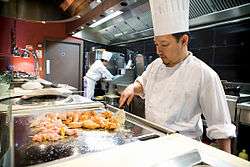
This is a list of cooking techniques. Cooking is the art of preparing food for ingestion, commonly with the application of heat. Cooking techniques and ingredients vary widely across the world, reflecting unique environmental, economic, and cultural traditions and trends. The way that cooking takes place also depends on the skill and type of training an individual cook has.
This is a comprehensive list of cooking techniques, and includes techniques that are unique to various countries, provinces, states, regions and cultures.
Cooking techniques
A
- Amandine – a culinary term indicating a garnish of almonds. Dishes of this sort are usually cooked with butter and seasonings, then sprinkled with whole or flaked, toasted almonds.
- Amylolytic process – used in the brewing of alcohol from grains
- Anti-griddle – a kitchen appliance that flash freezes or semi-freezes foods placed on its chilled metal top.[1]
B
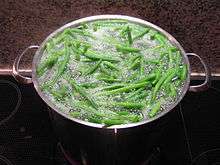
The first step in blanching green beans
- Backwoods cooking – a method of cooking without the use of utensils that commonly takes place in the backwoods, often in combination with wild or conventional camping
- Baghaar – a cooking technique used in Pakistani cuisine and Indian cuisine in which cooking oil is heated and spices are added to fry. The oil is then added to a dish for flavoring.
- Broasting – a method of cooking chicken and other foods using a pressure fryer and condiments
- Browning – the process of partially cooking the surface of meat to help remove excessive fat and to give the meat a brown color crust and flavor through various browning reactions
C
Hot liquid candy being poured into candy molds by a candymaker
Hamburgers cooking on a charbroiler
- Candy making – the preparation of candies and sugar confections made by dissolving sugar in water or milk to form a syrup, which is boiled until it reaches the desired concentration or starts to caramelize
- Caramelization – the browning of sugar, a process used extensively in cooking for the resulting nutty flavor and brown color
- Carry over cooking – the phenomenon that food retains heat and continues to cook even after being removed from the source of heat.[2]
- Casserole – food cooked and served in a casserole dish
- Charbroiling – a commonly used cooking device consisting of a series of grates or ribs that can be heated using a variety of means, and is used in both residential and commercial applications for a variety of cooking operations
- Chaunk – often translated as "tempering", is a cooking technique and garnish used in the cuisines of India, Bangladesh, and Pakistan, in which whole spices (and sometimes also other ingredients such as minced ginger root or sugar) are fried briefly in oil or ghee to liberate essential oils from cells and thus enhance their flavours, before being poured, together with the oil, into a dish.
- Cheesemaking – the craft of making cheese
- Chinese cooking techniques – a set of methods and techniques traditionally used in Chinese cuisine.[3] The cooking techniques can either be grouped into ones that use a single cooking method or a combination of wet and dry cooking methods.
- Red cooking – also called Chinese stewing, red stewing, red braising and flavour potting, is a slow braising Chinese cooking technique that imparts a red color to the prepared food.
- Clay pot cooking – a process of cooking food in a pot made from unglazed & natural clay
- Coddling – heating food in water kept just below the boiling point.[4] Coddled egg may be prepared using this method.
- Concasse – to rough chop any ingredient, usually vegetables. This term is particularly applied to tomatoes, where tomato concasse is a tomato that has been peeled, seeded (seeds and skins removed), and chopped to specified dimensions
- Conche – a surface scraping mixer and agitator that evenly distributes cocoa butter within chocolate, and may act as a 'polisher' of the particles
- Confit – a generic term for various kinds of food that have been cooked in grease, oil or sugar water (syrup)
- Cooking with alcohol – many dishes incorporate alcoholic beverages into the food itself
- Creaming – refers to several different culinary processes in baking, cooking and milk production
- Culinary triangle – a concept described by anthropologist Claude Lévi-Strauss involving three types of cooking; these are boiling, roasting, and smoking, usually done to meat.
- Curdling – the breaking of an emulsion or colloid into large parts of different composition through the physico-chemical processes of flocculation, creaming, and coalescence. Curdling is intentional and desirable in making cheese and tofu; unintentional and undesirable in making sauces and custards.
- Curing (food preservation) Curing is any of various food preservation and flavoring processes of foods such as meat, fish and vegetables, by the addition of a combination of salt, nitrates, nitrite, or sugar. Many curing processes also involve smoking, the process of flavoring, or cooking. The use of food dehydration was the earliest form of food curing.
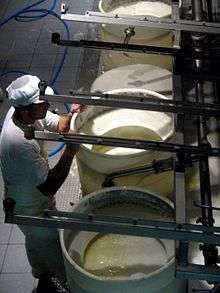 The production of Gruyère cheese at the cheesemaking factory of Gruyères, Canton of Fribourg, Switzerland
The production of Gruyère cheese at the cheesemaking factory of Gruyères, Canton of Fribourg, Switzerland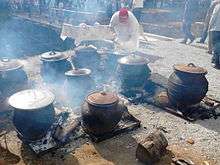 Cooking of Svadbarski Kupus (wedding cabbage) in clay pots, Serbia
Cooking of Svadbarski Kupus (wedding cabbage) in clay pots, Serbia A coddled egg atop hash
A coddled egg atop hash- Butter being creamed using electric beaters
D
A beef stew being cooked in a Dutch oven
- Deep frying
- Deglazing
- Degreasing
- Dough sheeting – used by (industrial) bakeries and rolls out dough into a (consistent) dough sheet with a desired even dough thickness prior to baking
- Dredging
- Dry roasting
- Drying – a food dehydrator refers to a device that removes moisture from food to aid in its preservation. A food dehydrator uses a heat source and air flow to reduce the water content of foods.
- Dum pukht – or slow oven cooking, is a cooking technique associated with the Awadh region of India, in which meat and vegetables are cooked over a very low flame, generally in sealed containers.
- Dutch oven cooking – A Dutch oven is well suited for long, slow cooking, such as in making roasts, stews, and casseroles. Virtually any recipe[5] that can be cooked in a conventional oven can be cooked in a Dutch oven. They are often used in outdoor cooking, such as when camping.
E
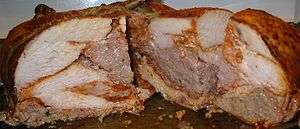
Engastration – The interior of a sausage-stuffed turducken
- Earth oven – one of the most simple and long-used cooking structures. At its simplest, it is a pit in the ground used to trap heat and bake, smoke, or steam food.
- Egg wash – usually beaten eggs sometimes mixed with another liquid, usually water or milk, which is brushed onto the surface of a pastry before baking
- En papillote – food is put into a folded pouch or parcel and then baked
- En vessie – a cooking method in which a meat or other dish is cooked in a (pig) bladder
- Engastration – a method of cooking in which the cook stuffs the remains of one animal into another animal
- Engine Cooking – cooking food from the excess heat of an internal combustion engine, typically the engine of a car or a truck
F

Bananas Foster being flambéed
- Fermentation
- Flambé
- Flattop grill
- Foam
- Food preservation
- Canning – involves the cooking of foods in sealed cans, among other processes
- Home canning
- Curing (food preservation)
- Fondue
- Fruit preserves
- Frying
G
H
- Hāngi – a traditional New Zealand Māori method of cooking food using heated rocks buried in a pit oven still used for special occasions.
- Hibachi
- High-altitude cooking
- Homogenization
- Hot salt frying
- Huff paste
I
.jpg)
A method of indirect grilling involves plank cooking, such as the salmon fillets here
- Indirect grilling
- Infusion – the process of extracting chemical compounds or flavors from plant material in a solvent such as water, oil or alcohol, by allowing the material to remain suspended in the solvent over time (a process often called steeping). A common example of an infusion is tea, and many herbal teas are prepared in the same way.
J
- Jugging – is the process of stewing whole animals, mainly game or fish, for an extended period in a tightly covered container such as a casserole or an earthenware jug.
- Juicing
K
.jpg)
Bo Kho (beef stew)
- Kalua – a traditional Hawaiian cooking method that utilizes an imu, a type of underground oven
- Karaage – a Japanese cooking technique in which various foods — most often chicken, but also other meat and fish — are deep fried in oil, similar to the preparation of tempura.
- Kho – a cooking technique in Vietnamese cuisine[6] in which a protein source such as fish, shrimp, poultry, pork, beef, or fried tofu is braised on low heat in a mixture of fish sauce, sugar, and water or a water substitute such as young coconut juice.
- Kinpira – a Japanese cooking style that can be summarized as a technique of "sauté and simmer". It is commonly used to cook root vegetables and other foods.
L
- Liquid nitrogen can be used for flash freezing and shattering
- Low-temperature cooking
M
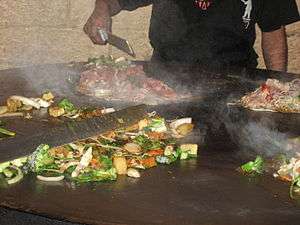
Food cooking on a Mongolian barbecue griddle
N
- Nappage
- Nixtamalization – a process for the preparation of maize (corn), or other grain, in which the grain is soaked and cooked in an alkaline solution, usually limewater, and hulled.
O
- Outdoor cooking – involves techniques and specialized equipment for preparing food in outdoors environments. Equipment used includes mess kits and portable stoves, among others.
P


A pig roast in Wittlich, Germany
- Pan frying – characterized by the use of minimal cooking oil or fat (compared to shallow frying or deep frying); typically using just enough oil to lubricate the pan
- Parbaking
- Parboiling
- Pascalization
- Paste
- Pasteurization
- Pellicle – a skin or coating of proteins on the surface of meat, fish or poultry, which allow smoke to better adhere the surface of the meat during the smoking process
- Pickling
- Pig roast
- Poaching
- Pre-ferment
- Pressure cooking – the process of cooking food, using water or other cooking liquid, in a sealed vessel—known as a pressure cooker, which does not permit air or liquids to escape below a pre-set pressure.
- Pressure frying
- Proofing
- Purée
R
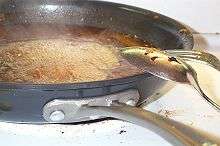
Stock being reduced in a pan
S

Bao stir frying involves high heat combined with continuous tossing. This keeps juices from flowing out of the ingredients and keeps the food crispy.

Milk being steamed
- Sautéing
- Schwenker
- Cured fish
- Searing – a technique used in grilling, baking, braising, roasting, sautéing, etc., in which the surface of the food (usually meat, poultry or fish) is cooked at high temperature until a caramelized crust forms.
- Seasoning
- Separating eggs
- Shallow frying
- Shirred eggs
- Shrivelling
- Simmering
- Slow cooker
- Smoking (cooking)
- Smothering
- Souring
- Sous-vide
- Spatchcock – poultry or game that has been prepared for roasting or grilling by removing the backbone, and sometimes the sternum of the bird and flattening it out before cooking.[7]
- Spherification
- Steaming
- Steeping
- Stew
- Stir frying
- Straight dough
- Stuffing – an edible food mixture, often a starch, used to fill a cavity in another food item
- Sugar panning
- Supreme – has different meanings in cooking and culinary arts depending upon the food type
- Sweating – the gentle heating of vegetables in a little oil or butter, which usually results in tender, sometimes translucent, pieces
- Swissing
- Syringe – for injecting fillings in foods
T
- Tandoor – a cylindrical clay or metal oven used in cooking and baking in Southern, Central and Western Asia,[8] as well as in the Caucasus.[9]
- Tataki
- Tenderizing – a process to break down collagens in meat to make it more palatable for consumption
- Teriyaki
- Thermal cooking – uses the concept of the haybox whereby placing hay or straw around a cooking pot of heated food the meal continues to cook without fuel.
- Thermization – a method of sterilizing raw milk with heat
- Thickening
- Transglutaminase – a protein binder, called meat glue
- Turbo cooking
- Turkey fryer
V
- Vietnamese cooking techniques – Many common culinary terms exist that are unique to Vietnam
W
- Wok cooking – The wok is used in a significant amount of cooking methods.
See also
References
- ↑ The Creators of Top Chef (14 July 2010). How to Cook Like a Top Chef. Chronicle Books. p. 157. ISBN 978-0-8118-7486-1. Retrieved 13 December 2012.
- ↑ Turner, Danielle. "Carryover Cooking". Cooking Clarified. Retrieved 27 November 2012.
- ↑ 傅, 培梅 (2008), 培梅食譜, 1, 旗林文化, ISBN 978-986-6655-25-8
- ↑ Kipfer, Barbara Ann (2012). The Culinarian: a Kitchen Desk Reference. Hoboken, N.J.: John Wiley & Sons. p. 137. ISBN 9780470554241.
- ↑ "Dutch Oven Recipes". The Iron Flame. Retrieved 1 May 2014.
- ↑ "The Taste of Tet; It wouldn't be the New Year without kho, the ultimate Vietnamese comfort food", by Andrea Q. Nguyen
- ↑ How to spatchcock that chicken, Knorr
- ↑ Raichlen, Steven (2011-05-10). "A Tandoor Oven Brings India's Heat to the Backyard". The New York Times.
- ↑ Raichlen, Steven (2011-05-10). "A Tandoori Oven brings India's heat to the backyard". New York Times. Retrieved 2011-05-09.
Further reading
- "Cooking Techniques". Better Homes and Gardens. Retrieved 11 October 2014.
- "Healthy cooking techniques: Boost flavor and cut calories". Mayo Clinic. Retrieved 11 October 2014.
- "Cooking Techniques". The New York Times. Retrieved 11 October 2014.
External links
| Wikibooks Cookbook has a recipe/module on |
This article is issued from Wikipedia - version of the 11/25/2016. The text is available under the Creative Commons Attribution/Share Alike but additional terms may apply for the media files.
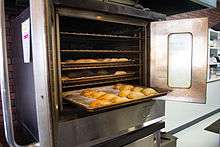
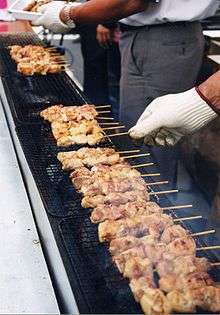
.jpg)